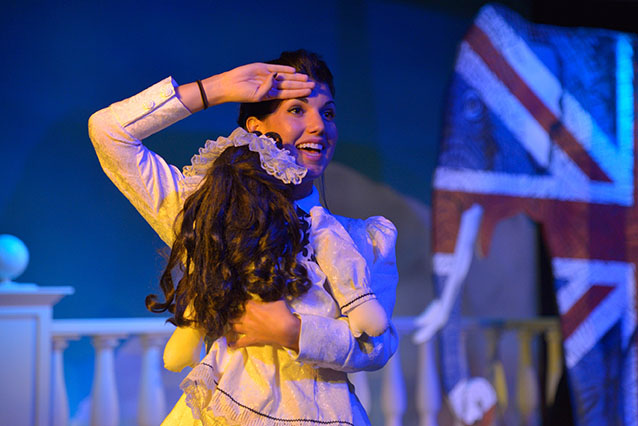
From performing in a circus tent and a round building used to train Allied navigators in World War II, the Jerry Herman Ring Theatre has evolved into a first of its kind theater-in-the-round building, which has created art for Miami over the past 75 years.
To kick off its 75th season, the Ring Theatre is performing “Cloud 9,” the famed drama by 20th century feminist and playwright, Caryl Churchill. The play opened Wednesday.
“Cloud 9” takes place in 1880 in Colonial Africa and paints a picture of the politics and gender identification of the Victorian era. The play is an ironic satire, challenging the norms of sexuality and gender roles within the dysfunctional characters of the main family and its servants. All of the actors switch characters from the first to the second act, and many switch genders as well.
Senior Brandon Beaver immersed himself in the challenge of performing the complex play.
“My favorite thing about the play is how it pushes the boundaries of what is socially and sexually acceptable,” Beaver said. “It’s so rewarding to watch a character struggle to finally break free of his or her social restraints and regain control of his or her own independence.”
The idea to perform “Cloud 9” was suggested by director Chris O’Connor, a University of Miami acting professor, after students in his senior acting class presented scenes from the play.
O’Connor hoped that the play’s structure would expose the students in the cast to the demands that certain playwright’s styles can put on actors.
“The students are doing well handling the challenges the play throws at them,” he said. “It will be extremely helpful for them to have a play like this under their belts.”
O’Connor explained how the playwright used the actors’ genders to make a critical statement about society’s views on gender and sexuality.
“The wife of the main character is played by a male, their son is played by a female, their black servant is played by a white male, and their daughter is played by a doll,” O’Connor said. “Churchill was a revolutionary feminist and used theatrical methods to call attention to the most important, yet often ignored, social issues of the time.”
In a potentially confusing shift, the play’s second act takes place 100 years later in the year 1980, but the same characters remain, as only 25 years have passed in their lives.
Although the second act is set in a more contemporary time, the characters still struggle through the same issues, this time with a bit of a 20th century perspective. In the second act, the actors switch characters and the work becomes more of a realistic drama.
In the first act, Beaver plays Betty, the wife of a colonial administrator. The actor had to approach the female role in a way that was both physically and mentally different.
“I had to not only observe the mannerisms of the opposite sex, but also change the way I approach decisions and conflict within the play,” he said. “I’ve realized that men attempt to solve problems directly, while women approach problems in a more circular manner often times because of emotional investment to the conflict.”
Junior Schyler Rice can attest to the challenge of acting in “Cloud 9.” She plays Edward, Betty’s son, in the first act and replaces Beaver as Betty in the second act.
“Because I played different characters of different ages, genders and accents, the roles were a bit of a reach for me, but I’ve absolutely enjoyed that challenge,” she said.
Despite weeks of rehearsals, the actors continue to learn from the play.
“Each rehearsal, I learn something new about the characters,” she said. “‘Cloud 9’ is one of those plays that one can dive into and keep finding more and more that might not have been clear at the surface.”
“Cloud 9”
Where: Jerry Herman Ring Theatre, 1312 Miller Drive, Coral Gables
When: 8 p.m. Wednesdays through Saturdays, and 2 p.m. on Saturdays and Sundays until Oct. 5
Tickets: $8 to $20; free for students on Tuesday
4For more information, visit miami.edu/ring or call 305-284-3355.






